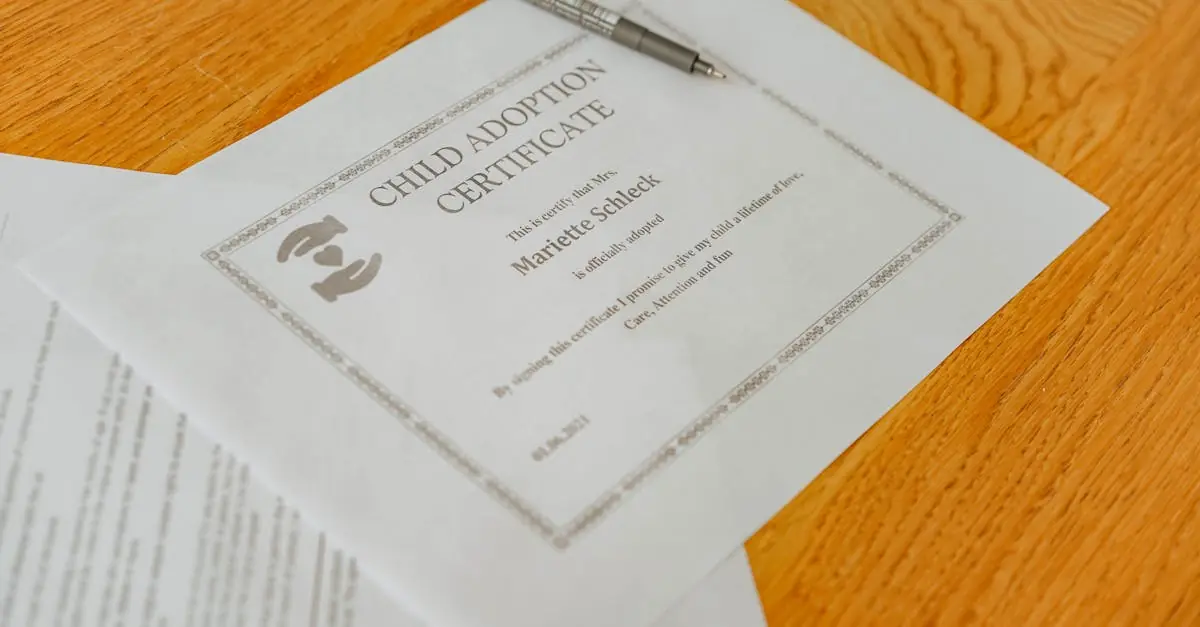Adoption certificates—those little pieces of paper that pack a powerful punch! They’re not just official documents; they’re the heartwarming proof of love, commitment, and a family’s journey. Imagine holding a certificate that signifies a child’s new beginning and the joy of a family growing in unexpected ways. It’s like a VIP pass to the most exclusive club: parenthood!
But what’s the deal with adoption certificates? Why do they matter? Well, they’re essential for legal recognition and can even come in handy for everything from school enrollments to travel plans. Plus, they’re a great conversation starter at family gatherings—who wouldn’t want to share their adoption story? So let’s dive into the world of adoption certificates and uncover why they’re more than just paper; they’re a testament to love and new beginnings.
Table of Contents
ToggleWhat Is an Adoption Certificate?
An adoption certificate serves as an official record of the legal adoption process. It’s essential for recognizing a child’s new family identity.
Definition and Purpose
An adoption certificate documents the completion of an adoption. It includes vital information like the child’s name, adoptive parents’ names, and the adoption date. This certificate holds significance beyond legalities. It represents a family’s commitment and the love shared among its members. Families often use it for important life events, such as school enrollments or medical purposes. It’s also instrumental when traveling, as it verifies relationships between parents and children. The certificate becomes a cherished keepsake, symbolizing the unique journey of each family.
Legal Significance
The legal significance of an adoption certificate is profound. It offers legal recognition of the adopted child’s new identity. Courts issue the certificate, solidifying the relationship between the child and adoptive parents. This document replaces the child’s original birth certificate in many jurisdictions, emphasizing their new familial connection. Additionally, it ensures the adopted child has the same rights as biological children in matters like inheritance. The adoption certificate provides a clear legal understanding of the adopted child’s status in the eyes of the law.
Types of Adoption Certificates
Adoption certificates vary based on the circumstances surrounding the adoption process. Two primary types exist: domestic and international adoption certificates.
Domestic Adoption Certificates
Domestic adoption certificates serve as official documents in adoptions occurring within a country, such as the United States. Each certificate contains essential information, including the child’s new name, adoptive parents’ names, and the date the adoption became final. This document typically replaces the original birth certificate, granting the adopted child the same legal rights as biological children. Securing a domestic adoption certificate often requires completing specific legal processes, ensuring the adoption is recognized by state law.
International Adoption Certificates
International adoption certificates apply to adoptions that involve families from different countries. These certificates document not only the new name of the adopted child but also information relevant to the child’s country of origin. Legal aspects vary, depending on the laws in the adoptive parent’s country and the child’s home country. An international adoption certificate often comes with additional documents, such as visas and immigration papers, facilitating the child’s entry and recognition in the adoptive country. This certificate emphasizes a family’s love and commitment, bridging cultural differences while ensuring legal identification.
How to Obtain an Adoption Certificate
Obtaining an adoption certificate involves a clear process and necessary documentation. Understanding both is crucial.
Application Process
Start by contacting the appropriate local or state government agency. Each region may have specific guidelines for the application process. Fill out the adoption certificate application form, which can often be found online or at local offices. Some jurisdictions may require payment of a small fee alongside the application. After submitting the form, expect a waiting period during which the agency reviews the request. Response times can vary, so check with the specific agency for estimated processing timelines.
Required Documentation
Gathering the correct documentation is essential for a successful application. Typically, applicants need to provide a copy of the finalized adoption decree, which proves the legal adoption. Identification documents, such as a government-issued ID or driver’s license, are often required as well. Some agencies may also request a copy of the child’s birth certificate prior to adoption. Additional supporting documents might include medical records or proof of residency. Verify the specific documentation requirements with the relevant agency to ensure a smooth application process.
Benefits of Having an Adoption Certificate
An adoption certificate provides numerous benefits essential for both legal recognition and emotional connection within families. Understanding these advantages helps families appreciate the importance of obtaining this document.
Legal Benefits
Legal rights accompany possession of an adoption certificate. This document serves as official proof of adoption, granting the adopted child equal rights under the law. The certificate replaces the original birth certificate, ensuring the child’s identity aligns with their adoptive family. Parents can enroll their children in school, access healthcare, and secure documentation without complications. Moreover, the certificate facilitates inheritance rights, allowing the adopted child to inherit just like biological children. Legal recognition proves vital in situations requiring identification, such as travel or applying for government benefits.
Emotional and Social Benefits
Emotional connections flourish within a family that holds an adoption certificate. This document symbolizes love, acceptance, and commitment. Families can share their stories confidently, creating opportunities for connection with others who have similar experiences. Children feel a sense of belonging and identity, knowing they are part of a forever family. Additionally, the adoption certificate opens up discussions about adoption in a positive manner. A supportive community often forms around shared journeys, allowing families to build relationships based on understanding, acceptance, and love.
Conclusion
Adoption certificates are invaluable assets for families navigating the adoption journey. They not only provide legal recognition but also embody the love and commitment that define a family. These documents facilitate essential processes like school enrollments and healthcare access while fostering a sense of belonging for the adopted child.
By sharing adoption stories, families can create connections with others and contribute to a supportive community. Ultimately, adoption certificates serve as powerful symbols of identity and acceptance, enriching the lives of those involved and affirming the bonds that unite them.




